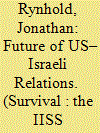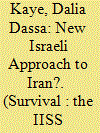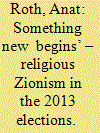| Srl | Item |
| 1 |
ID:
181191


|
|
|
|
|
| Summary/Abstract |
The special relationship between the United States and Israel has been built on three pillars: shared strategic interests, the resonance of Israel in American political culture and the influence of the pro-Israel lobby. While the strategic pillar has been the most controversial, as many in Washington have viewed Israel as a strategic liability, the dramatic improvement in relations between Israel and America’s Gulf Arab partners has diminished this concern. But the once strong cultural and domestic political pillars are now under strain. In the wake of a sharp decline in sympathy for Israel within the Democratic Party, bipartisan support for Israel is now in doubt. The new Israeli government has the potential to arrest and reverse this decline. Without progress towards a two-state solution to the Israeli–Palestinian conflict, however, the challenge will remain.
|
|
|
|
|
|
|
|
|
|
|
|
|
|
|
|
| 2 |
ID:
183790


|
|
|
|
|
| Summary/Abstract |
Israeli Prime Minister Naftali Bennett’s cordial relations with the Biden administration and relatively muted posture during nuclear negotiations in Vienna raise questions about whether his government is pursuing a different strategy towards Iran than did his predecessor, Benjamin Netanyahu. This article argues that it is not. Despite reinvigorated Israeli debates critical of Netanyahu’s policies and improved atmospherics with the American government, official Israeli policy remains essentially unchanged. The Israeli government is still wary of nuclear diplomacy, offers few alternatives to continued diplomatic and economic pressure, and views military options as viable even if they can only set back Iran’s nuclear programme temporarily. While Bennett wants to avoid open confrontation with Washington, Israel will not relax tensions with Iran, particularly in non-nuclear arenas like Syria. In the past, Israeli sabotage against Iran’s nuclear assets subsided in the run-up to and after the nuclear agreement; this time around, Israel may not feel so constrained.
|
|
|
|
|
|
|
|
|
|
|
|
|
|
|
|
| 3 |
ID:
137546


|
|
|
|
|
| Summary/Abstract |
Habayit Hayehudi party was one of the most noteworthy phenomena of the general elections held in Israel in 2013. In the 2009 elections the party's main predecessor only won three seats, and polls conducted in the first half of 2012 cast doubt upon its chances of passing the minimum threshold. Defying these predictions, Habayit Hayehudi won 12 seats to become the fourth largest Knesset party. This article's primary claim is that the party's success derived from its leaders' ability to cater to the aspirations and needs ensuing from the traumatic 2005 Gaza disengagement and to replace the feelings of distress and disorientation with a positive momentum.
|
|
|
|
|
|
|
|
|
|
|
|
|
|
|
|